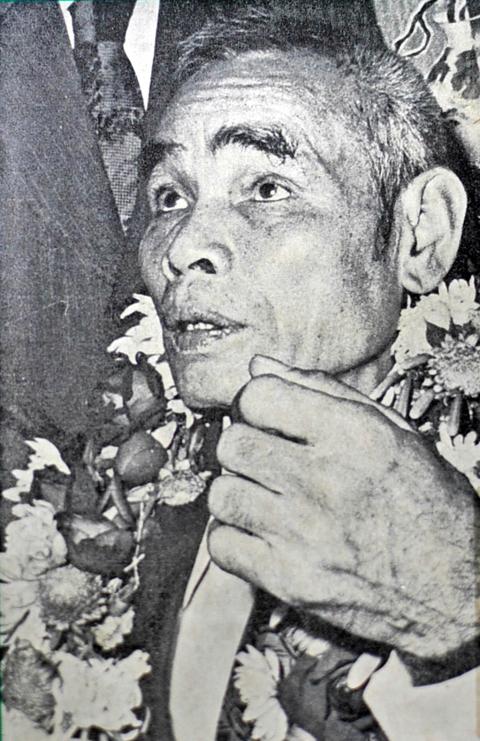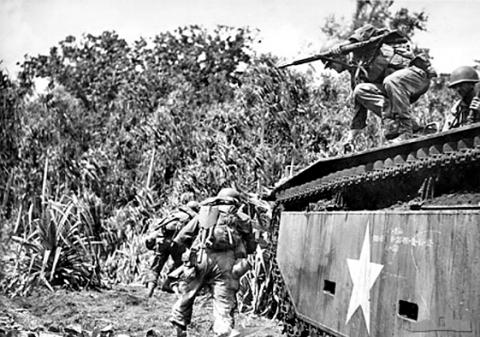Taiwan in Time: Jan. 4 to Jan. 10
On Jan. 8, 1975, nearly 30 years after the end of World War II, former Imperial Japanese Army soldier Nakamura Teruo finally returned home.
It was a different place from what he had known. His native land was no longer part of Japan. His son, who was an infant when he left, was now a father of four children, and his wife had remarried. Everyone was calling him Lee Kuang-hui (李光輝) — a name he had never even heard of when he departed for Indonesia with the Takasago Volunteer Unit in 1944.

Photo: Wikimedia Commons
A member of the Amis people, Western reports have his Aboriginal name as Attun Palalin, while local sources call him Suniuo, which is what this article will go with.
Even though the Takasago were a volunteer army in name, Suniuo says he was forced to enlist. Shortly after he landed on Morotai Island in Indonesia, the Allies arrived and secured it as a base. Suniuo lost contact with his group during this time.
Armed with an assault rifle, a helmet, knife, cooking pot and a mirror, Suniuo built a hut and remained in the jungle alone, surviving by hunting and farming. He did not know that the war had already ended, as the Japanese army declared him dead on Nov. 13, 1944.

Photo: Wikimedia Commons
Unsure of the situation outside of the jungle, Suniuo stayed hidden at all costs, cooking only in the dark so people wouldn’t see the smoke. In a first-hand account published shortly after his return titled Struggle in the Jungle for 30 Years (叢林掙扎三 十年), Suniuo recalls counting the days by the moon and recording each cycle by tying a knot in a rope. He says his upbringing in the mountains in relative poverty provided him the will and ability to survive for so long.
“I calmly stayed alive there,” he says. “Although I didn’t have anybody to talk to, buried deep in my heart seemed to be a glimmer of hope and expectation. The only trace of happiness during this time came from the fact that I was still alive and I hadn’t lost my sense of existence yet.”
As Suniuo’s only clothes deteriorated over time, he says he became used to being naked most of the time, only using a US Army jacket he found to cover himself at night.
Most of his time was devoted to finding food, he says. He grew sweet potatoes, beans, bananas and sugar cane in his garden, gathered roots and fruits and trapped boar, pheasant and other birds.
“Not to lose my life became my only goal, and that exhausted almost all of my time,” he says.
The only two forms of entertainment he had was fishing and fiddling with a home-made abacus. In order to keep himself from thinking of his family at home, he stayed busy exploring his surroundings and undertaking various improvement projects around his hut.
Suniuo says he made a grave error in assuming that war wasn’t over from the planes that flew by above him each day, only later to find out that it was because the jungle was near an Indonesian air force base. As aviation technology improved over time, planes became faster and sleeker, and Suniuo thought it was the result of an arms race between the two warring sides.
“I made one simple wrong judgment, and it cost me 30 years,” he says.
In November 1974, local reports surfaced of a “naked wild man” in the mountains, prompting the Indonesian army to send an expedition force, which, after 30 hours, found Suniuo chopping wood outside his hut.
This brought up the question of whether he should be repatriated to Japan or Taiwan. Suniuo was given the choice, and he chose his homeland.
According to this biography, his back pay as a soldier over 30 years only amounted to about NT$7,000. But after some commotion in the media, the Japanese government decided to give him over NT$380,000 instead. He later received various donations from Japanese, Indonesian and local sources.
Yet, a return after so long has to be bittersweet. His parents were dead, and only two siblings survived — all going by Chinese names now. Suniuo’s wife’s new husband (of more than 10 years) was originally willing to move out and let the couple reunite, but Suniuo decided not to disturb their life and bought an apartment nearby. Just four years after his return, he died of lung cancer.
Taiwan in Time, a column about Taiwan’s history that is published every Sunday, spotlights important or interesting events around the nation that have anniversaries this week.

As Taiwan’s second most populous city, Taichung looms large in the electoral map. Taiwanese political commentators describe it — along with neighboring Changhua County — as Taiwan’s “swing states” (搖擺州), which is a curious direct borrowing from American election terminology. In the early post-Martial Law era, Taichung was referred to as a “desert of democracy” because while the Democratic Progressive Party (DPP) was winning elections in the north and south, Taichung remained staunchly loyal to the Chinese Nationalist Party (KMT). That changed over time, but in both Changhua and Taichung, the DPP still suffers from a “one-term curse,” with the

Jan. 26 to Feb. 1 Nearly 90 years after it was last recorded, the Basay language was taught in a classroom for the first time in September last year. Over the following three months, students learned its sounds along with the customs and folktales of the Ketagalan people, who once spoke it across northern Taiwan. Although each Ketagalan settlement had its own language, Basay functioned as a common trade language. By the late 19th century, it had largely fallen out of daily use as speakers shifted to Hoklo (commonly known as Taiwanese), surviving only in fragments remembered by the elderly. In

William Liu (劉家君) moved to Kaohsiung from Nantou to live with his boyfriend Reg Hong (洪嘉佑). “In Nantou, people do not support gay rights at all and never even talk about it. Living here made me optimistic and made me realize how much I can express myself,” Liu tells the Taipei Times. Hong and his friend Cony Hsieh (謝昀希) are both active in several LGBT groups and organizations in Kaohsiung. They were among the people behind the city’s 16th Pride event in November last year, which gathered over 35,000 people. Along with others, they clearly see Kaohsiung as the nexus of LGBT rights.

In the American west, “it is said, water flows upwards towards money,” wrote Marc Reisner in one of the most compelling books on public policy ever written, Cadillac Desert. As Americans failed to overcome the West’s water scarcity with hard work and private capital, the Federal government came to the rescue. As Reisner describes: “the American West quietly became the first and most durable example of the modern welfare state.” In Taiwan, the money toward which water flows upwards is the high tech industry, particularly the chip powerhouse Taiwan Semiconductor Manufacturing Co (TSMC, 台積電). Typically articles on TSMC’s water demand